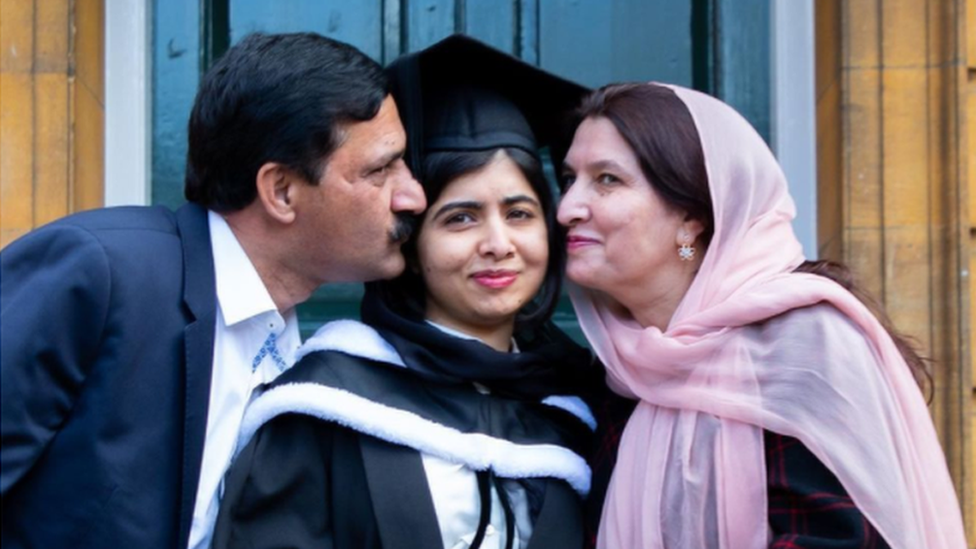Malala Yousafzai

By Esrom Habtamu
2024 Nov 11
Malala Yousafzai is a global symbol of courage and a passionate advocate for girls' education. Born in the Swat Valley of Pakistan in 1997, Malala grew up in a region that would soon face the brutal rule of the Taliban, an extremist group that banned girls from attending school. Despite the danger, Malala used her voice to defy oppression, a choice that nearly cost her life but ultimately led to her becoming the youngest Nobel Peace Prize laureate and one of the most inspiring figures of our time.
Early Life of Malala Yousafzai: A Passion for Learning
From a young age, Malala was captivated by the power of education. Encouraged by her father, Ziauddin Yousafzai, an educator himself, she believed that education was a fundamental right for everyone—especially girls, who are often denied the same opportunities as boys. But in 2007, when the Taliban took control of the Swat Valley, they enforced strict rules, including a ban on girls' education. For Malala, this was unacceptable. She began speaking out, despite the risks, and quickly became a local voice for girls’ rights.
At just 11 years old, Malala began blogging anonymously for the BBC under the pseudonym "Gul Makai," describing life under Taliban rule and her determination to continue her education. Her words reached audiences around the world, drawing attention to the struggles of girls in Pakistan. Her courage made her a target, but Malala was unafraid, and determined to continue her fight for equality.
The Attack That Shook the World
Malala's outspoken activism came at a high price. On October 9, 2012, while she was returning home from school, a Taliban gunman boarded her bus, called out her name, and shot her in the head. The attack shocked the world and brought international attention to the fight for girls' education. Malala was rushed to a hospital in Pakistan and later flown to the United Kingdom for specialized treatment. Remarkably, she survived the attack, a testament to her strength and resilience.
During her recovery, Malala continued her advocacy, refusing to be silenced by fear. Instead, she emerged stronger, even more determined to ensure that every child, especially girls, had the right to an education. Her survival and unwavering resolve made her an icon, galvanizing support for education and human rights worldwide.
The Malala Fund and Her Impact on Girls' Education
In 2013, Malala co-founded the Malala Fund with her father, a non-profit organization dedicated to advocating for girls’ education and empowering young girls to achieve their potential. Through the Malala Fund, she has worked tirelessly to ensure that girls around the world have access to 12 years of free, safe, and quality education. Her organization provides funding for education initiatives in countries where girls face significant barriers, including Pakistan, Afghanistan, and Nigeria.
In 2014, at just 17 years old, Malala became the youngest person ever to receive the Nobel Peace Prize. This historic achievement highlighted her commitment to peace, education, and equality, as well as her role as a voice for oppressed girls worldwide. Today, the Malala Fund continues to support local advocates, champion policies that improve educational access, and amplify the voices of young girls around the world.
Malala Yousafzai’s Legacy: A Global Symbol of Courage
Malala’s story is far from over. She graduated from Oxford University in 2020 with a degree in Philosophy, Politics, and Economics, equipping herself with even more knowledge to fuel her advocacy work. As a young woman, Malala has already inspired millions, but she remains committed to a future where no child is denied an education. Her memoir, I Am Malala, and her global speeches have reached and inspired countless individuals, serving as a reminder of the power of resilience and the importance of standing up for what’s right.

Image: Malala Graduates from Oxford University
Malala Yousafzai is more than a survivor—she is a leader, a Nobel laureate, and a relentless advocate for girls’ education. Her story reminds us that even the youngest voices can be the loudest forces for change and that, with courage and conviction, we can all make an impact in the fight for equality and justice.
Inspired by Malala’s story? Share your thoughts in the comments below! Let us know how her journey resonates with you, and tell us who you’d like to see featured next on Timeless Women. Who are the other fearless women whose stories deserve to be told?
Here are some resources and references for you to explore the story of Malala further.
Reference List:
- Yousafzai, Malala, and Christina Lamb. I Am Malala: The Girl Who Stood Up for Education and Was Shot by the Taliban. Little, Brown and Company, 2013.
- Malala Fund. Malala Fund Official Website.
- BBC News. Malala Yousafzai: Life After the Attack. BBC News, 2012.
- United Nations. Malala Yousafzai – UN Messenger of Peace. www.un.org
- Nobel Prize. The Nobel Peace Prize 2014 – Malala Yousafzai. www.nobelprize.org
Resource List:
- Malala Fund – Educational Resources for Girls.
- The Malala Fund Blog.
- UNICEF – Girl’s Education. www.unicef.org
- GirlUp – A Campaign for Girls' Education. www.girlup.org
- "He Named Me Malala" – Documentary (2015).
- Global Partnership for Education – Malala Yousafzai Campaigns. www.globalpartnership.org
Subscribe to our newsletter
Get weekly updates on the latest stories.